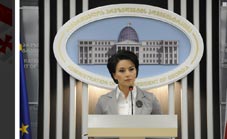A Year of Progress for Georgia’s Foreign Policy
By Etuna Tsotniashvili
Wednesday, December 29

The Press Speaker commented on security issues and said that security remains as one of the challenges for Georgia and the major reason for that is Russia. “Unfortunately when we are speaking about challenges we have to speak about our occupied territory which remains the most important issue for the country’s leadership. Despite the fact that our peaceful initiative lacks an adequate answer from the Russian side, we are ready to start a dialogue with Russia about the problematic issues which exist between our two countries. Unfortunately Moscow continues its destructive actions which can be seen in its divertive acts as well as spy scandals,” Manjgaladze said.

Vashadze talked about EU-Georgia relations, saying that several agreements have been signed during the year including visa facilitation and readmission agreements. “We have finished internal procedures and now we are waiting for the EU to finish its procedures regarding this issue. European parliament has already ratified them and the agreements will come into force no later than March,” Vashadze said.
According to the Minister, Georgia’s MFA made considerable efforts to establish diplomatic relations with the U.S., Africa and Asian States in 2010. The year was also significant from point of view of international agreements. Vashadze said 67 international agreements were signed in 2010.
“Despite economic difficulties, we opened three new embassies in Brazil, Portugal and Mexico. Three new embassies will be opened next year in Africa and two others will be announced at a later time,” Vashadze said.
The Minister underlined that the problem of territorial integrity was the most topical and painful issue on the agenda. Vashadze said that activities in this direction would be intensified next year.
He said the activities of the ministry were focused on the defense of Georgian interests abroad; these activities included 37 visits in various states, 67 visits of his deputies, 70 bilateral consultations on various levels. Georgia established diplomatic ties with 23 countries; today the country has contacts with 145 out of 191 UN member states. Georgia signed 67 international agreements throughout 2010.
“If we assess 2010 in one sentence, I can say that we are not well, but we are better,” Vashadze stated.
